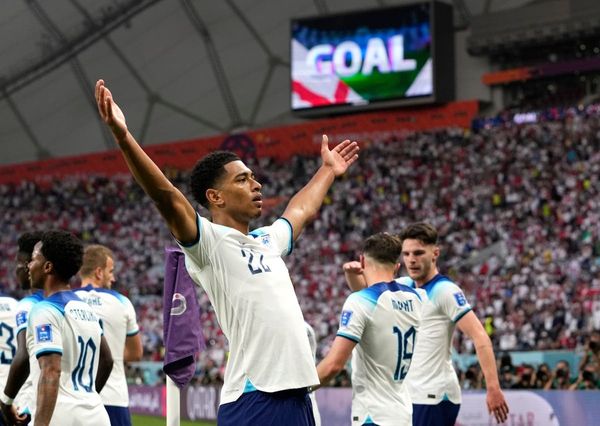England have never enjoyed an opening World Cup match like this. Six goals, and a performance soaked in exuberance and enticing possibilities, laid down an early marker for the next four weeks in Qatar. Yet this game will surely be remembered for something else entirely: the remarkable sight of Iran’s players refusing to sing the national anthem in a gesture of solidarity with oppressed women and protestors back home.
As the anthem rang out across the Khalifa International Stadium, Iran’s players pursed lips, bowed heads and locked shoulders. Their 1,000-yard stares told you something else too: that they, and their families, may soon pay a heavy price. And yet they carried on. The defiant, and the damned. A TV camera cut to an Iranian woman in the stands. She was crying.
Many Iranian women here sported T-shirts with the phrase “Woman, Life, Freedom”, which has become the rallying cry for protestors since a 22-year-old Kurdish-Iranian woman, Mahsa Amini, died in hospital while in police custody. Her crime? Not wearing a headscarf correctly. They also wore skirts and dresses, sang songs and smiled: basic freedoms denied back home.
This is a World Cup like no other. For the last 12 years the Guardian has been reporting on the issues surrounding Qatar 2022, from corruption and human rights abuses to the treatment of migrant workers and discriminatory laws. The best of our journalism is gathered on our dedicated Qatar: Beyond the Football home page for those who want to go deeper into the issues beyond the pitch.
Guardian reporting goes far beyond what happens on the pitch. Support our investigative journalism today.
What made this display of courage from Iran’s players so powerful is that they had come under immense pressure to stay out of the revolution in Iran, which human rights groups say has led to more than 450 people being killed and more than 15,000 being arrested.
Watching on were two Iran supporters, Bardia and Fred, who praised the bravery of the players. Bardia had put black tape over the badge on his team shirt to signal his opposition to the regime, while Fred explained why so many thousands were cheering their team on in Qatar.
“For Iranians all over the world, our hearts are with the women and the young,” he said. “Our team belongs to the people, not the Islamic regime.”
The Iran team fought hard over the following 90 minutes, but they were no match for England. For years, supporters have urged Gareth Southgate to “release the handbreak”. Not only did England’s manager do that, he poured super-diesel in the tank and slammed down the accelerator.

A goal from the teenager Jude Bellingham started the rout before Bukayo Saka (two), Raheem Sterling, Marcus Rashford and Jack Grealish finished the job. Grealish’s celebration was particularly noteworthy. The Manchester City playmaker had promised an 11-year-old fan with cerebral palsy that he would perform a celebration in his honour the next time he scored – and proved as good as his word.
Not that Southgate was entirely happy, noting with frustration how his team had conceded two late goals. “We know Iran are usually really difficult to score goals against, so it’s a credit to our players and the movement, the quality of our passing, the quality of our finishing,” he said. “But I didn’t like the end of the game. I understand the focus drifting but that won’t be enough for us to progress in the tournament.”
It proved to be another hectic day at this World Cup, and it began with another protest coming to a meek end. For the past two months England and Wales have been among seven European countries promising to wear OneLove armbands to protest against discrimination in Qatar. However after Fifa warned them on Sunday night they would face sporting sanctions – including potentially a yellow card for their captains – they backed down on Monday morning.
From a sporting perspective, the decision was understandable, given it could lead to players missing crucial knockout matches. But the contrast with the bravery of Iran’s players was stark. As the former British Olympian Jeanette Kwakye noted: “The most powerful protests in global sport have not required permission.”
Perhaps surprisingly, Southgate said that he understood Fifa’s decision. “You can set a precedent and it’s very difficult as to where to draw the line,” he said. “But people know what we stand for.”

However numerous human rights organisations were far less forgiving, with the veteran gay rights campaigner Peter Tatchell accusing Fifa’s president, Gianni Infantino, of showing his “true colours” after speaking about inclusivity at the weekend.
“I urge the team captains at their post-match press conferences to spend just 30 seconds to speak out for the rights of women, LGBTs and migrant workers,” he said. “That would have a huge impact, reaching a global audience of hundreds of millions of people.
“Fifa has crushed the OneLove campaign with the threat of yellow cards. It’s time to show Fifa and Qatar the red card.”
Fifa said it was only applying its long-held regulations “to preserve the integrity of the field of play” and that it was an “inclusive organisation”. Captains will instead wear other armbands as part of Fifa’s No Discrimination campaign.
Fifa was soon facing fire from a different direction as hundreds of England fans found themselves unable to log into their official mobile ticket app before entering the ground. Football’s governing body attempted to resolve the situation by resending ticketing emails and telling supporters to get them printed out at the stadium’s ticket resolution point.
But that led to huge queues, with many fans still outside when England and Iran kicked off, as scheduled, at 4pm. There was still time for a final surprise, with Iran’s coach, Carlos Queiroz, telling Iranian fans who booed the anthem to stay away from the World Cup if they were going to use it for political statements.
“Those who come to disturb the team with issues that are not only about football opinions are not welcome,” said Queiroz. “They are just simple football boys. They have one dream, to play football. It is not their fault that the World Cup happens at the moment. The moral is: let the kids play the game.”
Meanwhile bookmakers responded to England’s 6-2 victory by making them third favourites, behind Brazil and Argentina, for the trophy.
World Cups are not won in the first game, of course. But a tone can be set. A marker laid down. England are now even stronger favourites to win Group B. Accomplish that and a last-16 match against Ecuador or Senegal is on the cards. A quarter-final against a France team without several of their best players due to injury, or Denmark, could then follow. Whisper it, but here we go again.










